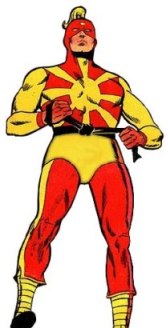Monday, March 27, 2017
The Losers - Gung-Ho!
Our Fighting Forces one hundred and sixty-two features an Ernie Chua cover which somewhat mistakes the story inside. The story is the last by Jack Kirby and is inked by D. Bruce Berry. The cover shows Sarge in charge of a bunch of kid soldiers but in the story it is Gunner who has that role.
The story begins as Gunner takes his makeshift squad of four French orphans named Jean Pierre, Eduard, Maurice, and Albert and attempts to use Marine discipline to make them useful as soldiers. The boys cleave to their new leader and seem eager for the attention. The Losers along with the Resistance are interrogating a Nazi officer about a suspected Nazi offensive. The Nazis arrive and the battle if pitched and The Losers are pinned down. Only the young boy squad can act and lead by Gunner they do bravely facing up to the Nazi forces. At first it seems they are all killed but that proves not to be the case. The boys yell "Gung-ho" to their leader Gunner as he is forced to leave his charges to go on another mission with the Losers who drive out of sight in the story's final panel.
The Losers are an odd outfit in that of the four men who make up the unit three are leaders. Johnny Cloud is a captain as is Storm. Sarge is well...that's obvious I guess. Only Gunner fills out the role of the regular grunt who takes orders and keeps on trudging. In this story we get to see him in a leadership role with willing fighters under his wing. He graduates a bit I supposes and becomes like the other Losers, a leader of men.
This is not only Jack Kirby's swan song on The Losers, but having fulfilled his five-year contract with DC, the "King" was taking his talents back to Marvel, the place where he had become one of comic's first superstars. Closing out accounts on Our Fighting Forces, Kirby also stepped away from his creations Kamandi, Last Boy on Earth and OMAC One Man Army Corp. To the casual fan it seemed that Kirby had left a few months earlier since on none of his books had been allowed to do covers, and frankly in those pre-internet days I thought that was the case. With the next issue the reliable war scribe Robert Kanigher took the reins joined by artists like George Evans and Ric Estrada.
But on The Losers Kirby really was able to take a feature and make it his own, creating stimulating and involving fables of war which spoke to the all-too human emotions which such cataclysmic events evoke. The Losers are fatalists, men who have accepted their destinies and are willing to die in battle, but their comradery makes them effective fighters and their humanity makes them heroes.Kirby knew war all too well, more intimately than I ever will than God, and I'll take his lessons to heart. He sought to teach all of us that it's not always the winners who make a difference in such vital conflicts, but also the losers.
No more war to come we can only hope.
Rip Off
Labels:
D. Bruce Berry,
DC Comics,
Ernie Chan,
Jack Kirby,
War Comics
Subscribe to:
Post Comments (Atom)







Outstanding work on your part as well here Rip. I plan to order this collection…”Even The Losers get lucky sometime.” – Tom Petty
ReplyDeleteI agree. You have really made the work sing and made it seem like a must have
DeleteThanks guys. I really enjoyed this series much more than I anticipated. I knew it was on my list of Kirby-stuff-I-have-not-read, so it had to happen. I didn't expect to enjoy nearly as much as I did.
DeleteRip Off
Wonderful work covering "The Losers", Rip.
ReplyDeleteBut I'd disagree with your assessment that Marvel was "the place where Jack Kirby had become one of comic's first superstars".
The Simon & Kirby "brand" was popular enough that they were cover-featured on a number of their DC and Prize books in the 40s-50s...something Marvel of the 1960s didn't do!
(Yes, Marvel promoted the heck out of creators inside the books, but not on the covers!
I know exactly what you mean. I thought about my assessment of "superstar" and went with the Marvel time frame because the idea of a comic book artist elevating to the status of a rock star for all intents and purposes was not really a thing. Comic strip artists perhaps, but not comic books. Kirby was part of making them a legit part of pop culture, even on some levels respected.
DeleteBut your point is very well taken. Marvel did seem to misunderstand the nature of what they had and as a consequence they lost it.
Rip Off